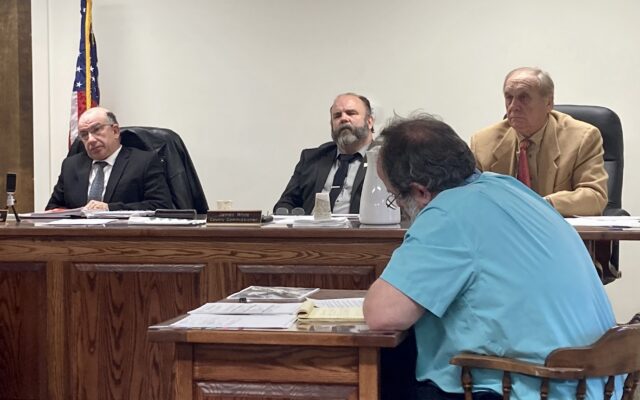
Piscataquis commissioners threaten to cut group’s funding over broadband fight
DOVER-FOXCROFT — Piscataquis County Commissioners, frustrated with the county’s economic development council’s former leader and his focus on broadband, debated this week whether to cut the group’s funding.
The commissioners’ frustration stemmed from the actions of John Shea, former executive director of the Piscataquis County Economic Development Council, who resigned in March after leading the group for two years. He became head of a nonprofit organization in Kansas.
The commissioners made clear to Shea in December that they would not support a broadband expansion project estimated to cost $22 million-$27 million and run more than 700 miles of fiber throughout the county, Chairman James White said. He was upset with Shea for sending an email to town managers that insinuated the county would spend half of its American Rescue Plan Act funds on the project, and the towns should allocate funds too, he said.
“We found that [email] very disingenuous and we called him [Shea] out for it,” White said at Tuesday’s meeting. “He said it was an oversight and didn’t mean for it to appear that way. We left it at that. But PCEDC has continued to solicit money from towns to go ahead with this project, against our desires.”
A broadband study completed in December included a hypothetical funding strategy, which Shea was referring to in the email, he said in January. The strategy required the county to use half of its remaining ARPA funds, or 7 percent of total costs, and municipalities to give all of their ARPA funds (7 percent of total costs), plus another use 49 percent from state and federal funds and the remaining 37 percent from service providers.
When he returned in February, Shea said he might have misunderstood the commissioners’ concerns. Commissioners discussed how they interpreted the $60,000 broadband planning study differently, specifically expecting to hear about all of the options for providing internet to unserved areas, not just fiber.
The commissioners laid out other concerns too, including that the county has funded an assistant for the group, but the position has not been filled, and that very little economic development has been achieved in the last two years.
Denise Buzzelli, executive director of the Piscataquis Chamber of Commerce and interim leader for the economic development council, said a strong candidate for director has been chosen, and there could be an announcement later this week.
“We were recognized by ConnectMaine [Authority] as a community of practice, which basically means that study, in their opinion, was extremely successful,” Buzzelli said. “It achieved what it was meant to do, which was to give towns information they needed to take their next steps.”
The ConnectMaine Authority recognized Piscataquis as a model for other counties, which led to a program involving a connectivity booster, who is a point person that the economic council will hire to guide municipalities on broadband expansion, she said. A $10,000 stipend from a program overseen by Maine Broadband Coalition will be used to fund the position.
The council was awarded $70,000 to create a new economic development strategy for Piscataquis, with a deadline of March 2023 for a plan, Buzzelli said. The organization also is waiting to hear back on its application for a $500,000 Brownfields Assessment grant from the Environmental Protection Agency, and another $100,000 grant focused on workforce attraction and development is pending.
“I know from our perspective, we’ve been working tirelessly to do everything we can for the businesses in the county,” Buzzelli said. The economic council can’t move forward without the support of the county, she said.
Tom Goulette, who serves on the Piscataquis County Economic Development Council’s executive committee, acknowledged the commissioners’ frustration and said, “you got your apology.” He defended Shea’s actions, calling them part of his job as director.
“The study, actually, isn’t totally worthless,” Goulette said. “It seems you’re using it for the basis of your proposal [to help people get internet]. You got something for your money. And PCEDC is about a lot more than just fiber. That’s one branch of the whole economic development process.”
Commissioners decided not to cut the group’s funding, although they maintained they were misled about the study.
Each time the budget cycle comes around, commissioners hear from constituents who ask what they’re receiving in return for their $100,000 to the economic development council, Commissioner Andrew Torbett said.
“We’re going to put a little hold on our frustration as far as funding, but we’re still looking at that,” he said.